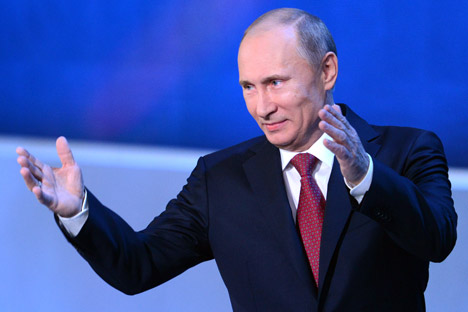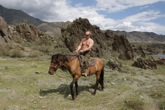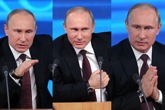In anticipation of Vladimir Putin’s India visit

Vladimir Putin is expected in India in December. Source: AFP / East News
Russian President Vladimir Putin is due to visit India in the first week of December for the 15th annual Indo-Russia Summit. There have been a lot of behind-the-scenes activities to ensure the visit is a huge success. India’s Ambassador to Russia P.S. Raghavan told this publication last week that Putin and Indian Prime Minister Narendra Modi will outline their vision for the development of the strategic relationship over the next decade.
After ties between Russia and India deteriorated during the Boris Yeltsin era, one of Putin’s important initiatives was the revival of strong relations between the two countries. The revival, solidification and growth of the Indo-Russian relationship can be considered one of Putin’s best foreign policy successes, largely keeping in mind that a big part of this success happened at the peak of ‘Indo-U.S. techie love affair.’
Putin has an overwhelmingly positive image in India, despite the fact that Indian daily newspapers rarely publish articles about Russia from non-Western sources. Although it may not necessarily be the editorial policy of Indian papers to run biased, anti-Russian articles, the very fact that unedited copy from news agencies and Western publications are used, means few people get a balanced perspective on Russia. The bad publicity from the West has had even a lesser impact on India’s Internet generation, which sees the Russian President as a hero and a symbol of power.
The last time Putin visited India for an annual summit was in December 2012, a week after the infamous gang rape and murder of a student in Delhi. The protests against the Indian government calling for stricter punishment of rapists were so widespread in the capital that the venue of the summit-level talks had to be shifted. The entire focus of the Indian media, including state-run broadcaster Doordarshan, was on these protests.
The 2012 visit, which was delayed by two months, was brief and businesslike. More than 10 bilateral agreements were signed, but the Russian President was in India for less than 24 hours. There were rumours at that time that he had some health problems, although no official source came close to confirming this.
Narendra Modi seems to have a real flair and passion for diplomacy and has won hearts abroad and impressed visiting heads of government in India. He has already invited Putin to visit Kudankulam, which hosts the nuclear power plant, one of the hallmarks of Indo-Russian cooperation. One has to wonder whether Putin’s delegation will served a multi-course Tamil lunch or dinner in a venue overlooking the Indian Ocean, the way Xi Jingping was treated to a Gujarati feast in Ahmedabad. (Few people really know whether the Chinese delegation enjoyed the sweetness of Gujarati cuisine).
Putin should use this trip as a PR exercise and find a way to engage the youth of the country, who seem to have nothing but adulation for him. Of course, the kind of stunts that were done keeping a domestic audience in mind can hardly be replicated in India, but a lot of options are on the table. One good way would be to interact with university students in an Indian metro city. Barack Obama won a lot of hearts in Mumbai and gained new fans when he addressed students at the St Xavier’s College. Maybe the Russian President can follow suit and meet students in a popular and fashionable academic institution that represents the new India. After all, Putin supporters in India are not by any means confined to universities that have some sort of nostalgia for the Soviet Union. Of course, meeting students of the Russian language would not only encourage them, but also inspire more young people in India to study the language.
In 2010, Dmitry Medvedev visited IIT Bombay, a prestigious institute set up with Russian assistance. He followed this up by meeting Raj Kapoor’s relatives. One important area for Indo-Russian cooperation is the film industry. There still is a market for contemporary Indian films in Russia, but more importantly, the country could be a great venue to shoot a Hindi blockbuster. This would put Russia on the travel map of hundreds of thousands of affluent and middle class Indians.
So far, very little information is available on the up-coming visit and even less on the image building part of the trip. Let’s hope that those people behind-the-scenes work out a trip that is not just high on substance, but also something that the people of India will remember for a long time to come.
Tailpiece:
It is sad that the world has evolved in such a way that state visits and summits have increasingly become short and down-to-business events. Nikita Khrushchev and Nikolay Bulganin’s 1955 visit to India and Indira Gandhi’s 1976 visit to the Soviet Union were both long and groundbreaking, and set the stage for unprecedented highs in bilateral ties.
All rights reserved by Rossiyskaya Gazeta.
Subscribe
to our newsletter!
Get the week's best stories straight to your inbox

